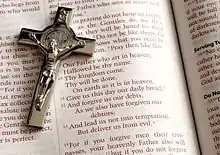daily bread
English
WOTD – 14 April 2017
Etymology

A Bible open to a page showing the Lord's Prayer in the Gospel of Matthew. Matthew 6:11 reads: “Give us this day our daily bread”.
Possibly a reference to the Lord's Prayer in the Bible, part of which reads in the King James Version: “Give us this day our daily bread” (see Matthew 6:11, and compare Luke 11:3).
Pronunciation
- (Received Pronunciation, General American) IPA(key): /ˈdeɪli ˌbɹɛd/
Audio (AU) (file) - Hyphenation: dai‧ly bread
Noun
daily bread (uncountable)
- All those things, such as regular food and water, needed to sustain physical life.
- 1599, “S Matthaevs. Cap. VI. [Saint Matthew. Chapter 6.]”, in Eliæ Hutteri [i.e., Elias Hutter], editor, Novvm Testamentvm D[omi]ni N[ost]ri Iesv[s] Christi: Syriacè, Ebraicè, Graecè, Latin, Germanicè, Bohemicè, Italicè, Hispanicè, Gallicè, Anglicè, Danicè, Polonicè [New Testament of Our Lord Jesus Christ: Syriac, Hebrew, Greek, Latin, German, Czech, Italian, Spanish, French, English, Danish, Polish], Nuremberg: [Alexander Philipp Dietrich], OCLC 38273087, page 79, column 1:
- [Verse] 11. Panem noſtrum ſuperſubſtātialem da nobis hodie. Giue us this day our daily bread.
- 1660, Richard Baxter, “The Epistle Dedicatory”, in A Treatise of Self-Denyall, Printed by Robert White, for Nevil Simmons bookseller in Kederminster, and are to be sold by him there, and by William Gilbertson at the Bible in Giltspurstreet without Newgate, and by Joseph Nevil at the Plow in Pauls Churchyard, OCLC 219899672:
- So do by your dignity and eſtate: As you muſt ask but your Daily bread, ſo muſt you deſire no more: Neither poverty, nor riches, but convenient food: yet ſo as to learn to abound and to want, and in every ſtate to be content: […]
- 1719 April 25, [Daniel Defoe], The Life and Strange Surprizing Adventures of Robinson Crusoe, […], 3rd edition, London: […] W[illiam] Taylor […], published 1719, OCLC 838630407, [https://archive.org/stream/lifeandstranges04defogoog#page/n164/mode/1up/ 156 page 156]:
- […] I ought never more to repine at my Condition, but to rejoice, and to give daily Thanks for that daily Bread, which nothing but a croud of Wonders could have brought.
- 1797, [John Bowdler], Reform or Ruin: Abridged. In which Every Man may Learn the True State of Things at this Time: And what that Reform is, which Alone can Save the Country!, 4th edition, London: Printed for J[ohn] Hatchard, no. 173, opposite Burlington House, Piccadilly, OCLC 740864307, page 17:
- To be thankful for ſuch good Things as we enjoy; for our Health, and Strength, and daily Bread, and many other Bleſſings, which we are too apt not to conſider as we ought. They are all the Gifts of God, and ought to be received as ſuch.
- 1905, Baroness Emmuska Orczy, “The Murder of Miss Pebmarsh”, in The Case of Miss Elliott, London: T. Fisher Unwin, OCLC 561849239, OL 8479084W:
- Money, mostly. Miss Pamela was over-fond of fine clothes, but Miss Pebmarsh, who was giving 'er a 'ome and daily bread, 'adn't much money to spare for fallalery.
-
- (by extension, chiefly Christianity) All those things, such as regular prayer, worship and meditation, needed to sustain spiritual life.
- 1534, William Tyndale, transl., “A Prologe to the Epistle of Paule to the Romayns”, in The Newe Testament (Tyndale Bible), Antwerp: […] Marten Emperowr, folio ccii, verso:
- I thynke it mete / that euery Chriſten man not only knowe it [the Epistle to the Romans] by rote and with oute the boke / but alſo exerciſe him ſelfe therin euermore continually / as with the dayly brede of the ſoule.
- 1817, Thomas Cranmer, “[Extracts from An Answer, by the Reverend Father in God, Thomas Archbishop of Canterbury, Primate of All England and Metropolitan, unto a Crafty and Sophisticated Cavillation, Devised by Stephen Gardiner, Doctor of Law, Late Bishop of Winchester, against the True and Godly Doctrine of the Most Holy Sacrament of the Body and Blood of Our Saviour Christ. First Printed in A.D. 1551, and afterwards in 1580, from which Last Edition the Extracts are Taken.] Connexion between the Sacraments and Our Resurrection.—At page 183.”, in Legh Richmond, editor, A Selection from the Writings of the Reformers and Early Protestant Divines of the Church of England. [...] This Volume Contains Various Tracts and Extracts from the Works of Archbishop Cranmer; with a Memorial of His Life (The Fathers of the English Church; 3), London: Published by John Hatchard, bookseller to the Queen, 190, opposite Albany, Piccadilly, OCLC 770459, page 629:
- For he [Augustine of Hippo] calleth there the daily bread, which we continually pray for, either corporal bread and meat, which is our daily sustenance for the body, or else the visible sacrament of bread and wine, or the invisible sacraments of God's word and commandments; of the which sacraments God's word is daily heard, and the other is daily seen.
- 1987, Father Gabriel of St. Mary Magdalen [i.e., Gabriele di Santa Maria Maddalena], “298. Corpus Christi: Thursday or Sunday after Trinity Sunday: Year A”, in Divine Intimacy, volume III (Ninth Sunday through Twenty-first Week of Ordinary Time), enl. and rev. edition, San Francisco, Calif.: Ignatius Press, →ISBN:
- This [the Eucharist] is not a physical food but a spiritual one, the very Body and Blood of Christ, offered for them as viaticum for their earthly journey. It is the "daily bread" which the faithful should ask for and eat [every]-day, more hungry and eager for it than for earthly bread.
-
Derived terms
- daily breader
Translations
things needed to sustain physical life
|
things needed to sustain spiritual life
|
Further reading
 Daily Bread (disambiguation) on Wikipedia.Wikipedia
Daily Bread (disambiguation) on Wikipedia.Wikipedia